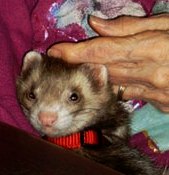Why Some Ferrets Bite and How to Stop Ferret Biting

Most ferrets are loving, playful, social animals. As with any pet, however, there are a few who seem to be biters. There is hope for the biter, however. Most aggressive ferrets can be turned into gentle pets if given the correct amount of training and patience. Read on for ways to stop ferret biting.
Ferrets can bite for many reasons–most are not due to aggressiveness. Before you address how to stop ferret biting, you need to identify the reason why your ferret is biting.
First of all, not all ferret bites should be considered attacks–most are not. Biting is sometimes the way a ferret tries to communicate. She may want to play and give you a nip to get your attention. If your ferret bites and holds on, or bites so hard that she draws blood, it is not a friendly nip. Both types of biting can be corrected.
Some reasons why a ferret may bite:
Baby ferrets
Young ferrets are natural nippers. They explore the world with their mouths and they also go through teething. If this is the case, it really should not be a concern, as they will grow out of it with a little training.
Untrained
Ferrets need to be trained not to nip when they are young. Ferrets play hard with littermates and playmates. They need to have limits set so they know how hard they can play with you.
Sick or injured
If your ferret isn’t feeling well or is hurt she can’t tell you. She may be in pain and want to be left alone. If this is a sudden change in behavior, it may be the case. Be sure to have her checked by a vet.
Unneutered
Unneutered ferrets can be more aggressive than neutered ones. Hormones can cause a male ferret to assert his dominance over others–including you. The solution is to get him neutered.
Change
Change, whether good or bad can be scary. A ferret in a strange situation or environment may be frightened and confused. When a ferret is under stress, she may bite. Give her time to adjust to the new situation, person or environment before you consider her biting a problem.
Displaced aggression
Some ferrets react aggressively to particular sounds, smells or objects. There may be no apparent reason–only your ferret knows why. With a little observation, you can identify what the smell, sound or object is. Common triggers are vacuum cleaners, brooms, loud music, and strong smells. You can keep your ferret away from the trigger–or at least keep her in her cage while doing household chores if this is the cause.
Trained to bite
If your ferret was cared for by someone else before you brought him into your home, he may have been inadvertently taught to bite. For example, if the person picked up the ferret and he nipped and then put him down to run around, the ferret may have associated nipping with getting the run of the house.
Mistrust
The main cause of ferret biting is mistrust. Your ferret may have had a bad experience with a person that traumatized him. Or, he may have been mistreated repeatedly. Ferrets can associate people with pain and react to protect themselves.
When you have identified the cause, you can address how to stop ferret biting.
There are right ways and wrong ways to teach your ferret not to bite. You will probably make the problem worse if you try any of the following:
- Mist a bitter spray or another so-called deterrent in your ferret’s face
- Flick her on her nose or head when she bites
- Hit her
- Put her in solitary confinement for long periods of time
- Bite her back
- Use her regular cage for a time-out
How to stop your ferret from biting
Depending on your ferret’s personality and past experiences, she may or may not respond to certain methods of reconditioning. There are several techniques you can try. Don’t give up on one tactic right away. It takes patience and consistency to stop ferret biting. However, if the biting gets worse after much consistency and patience, then you should probably move on to another method.
This list provides some obvious solutions and some more creative techniques. You may combine some of these tactics together, as well.
- Neuter an unaltered male
- Take your ferret to the vet to rule out any medical reasons
- If you know your ferret reacts to a particular trigger, keep him away from it
- If your ferret is young, visually or hearing impaired, take care not to startle her
- Make sure your ferret is well fed with a proper diet
- Spend more quality time with your ferret and get her more accustomed to being handled
- Put a bitter spray on your hands so they don’t taste good
- Yell “NO!” or “STOP” very loudly when she bites
- Say a firm “NO” or “STOP” and flip her on her back in a submissive position and hold her there for a few minutes when she bites
- Give him a 15-20 minute “time-out” in a small cage (not his regular cage) with no toys, bed or food immediately after biting
- Wrap him firmly in a towel and hold him or carry him around for 10-20 minutes and talk to him gently and pet his head
- Immediately substitute a toy for your hand or whatever was bitten and allow him only to bite that
- Add another ferret to your home as a playmate, so he has someone to play rough with

Remember if you want to stop a ferret from biting, you need to be consistent and firm, but gentle. Reward your ferret for good behavior. In time your ferret will learn to respond to kindness and gentleness with like behavior.
Your comments are welcome.

